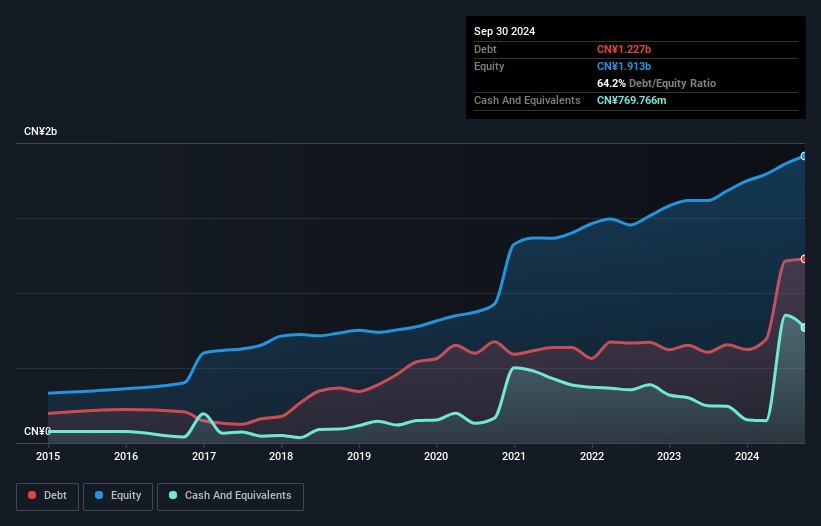Hunan Oil Pump (SHSE:603319) Seems To Use Debt Quite Sensibly

The external fund manager backed by Berkshire Hathaway's Charlie Munger, Li Lu, makes no bones about it when he says 'The biggest investment risk is not the volatility of prices, but whether you will suffer a permanent loss of capital.' It's only natural to consider a company's balance sheet when you examine how risky it is, since debt is often involved when a business collapses. We note that Hunan Oil Pump Co., Ltd. (SHSE:603319) does have debt on its balance sheet. But should shareholders be worried about its use of debt?
Why Does Debt Bring Risk?
Debt and other liabilities become risky for a business when it cannot easily fulfill those obligations, either with free cash flow or by raising capital at an attractive price. Ultimately, if the company can't fulfill its legal obligations to repay debt, shareholders could walk away with nothing. However, a more usual (but still expensive) situation is where a company must dilute shareholders at a cheap share price simply to get debt under control. Having said that, the most common situation is where a company manages its debt reasonably well - and to its own advantage. When we examine debt levels, we first consider both cash and debt levels, together.
Check out our latest analysis for Hunan Oil Pump
How Much Debt Does Hunan Oil Pump Carry?
As you can see below, at the end of September 2024, Hunan Oil Pump had CN¥1.23b of debt, up from CN¥654.2m a year ago. Click the image for more detail. On the flip side, it has CN¥769.8m in cash leading to net debt of about CN¥457.7m.

How Strong Is Hunan Oil Pump's Balance Sheet?
We can see from the most recent balance sheet that Hunan Oil Pump had liabilities of CN¥883.1m falling due within a year, and liabilities of CN¥940.1m due beyond that. Offsetting these obligations, it had cash of CN¥769.8m as well as receivables valued at CN¥916.0m due within 12 months. So its liabilities outweigh the sum of its cash and (near-term) receivables by CN¥137.5m.
Of course, Hunan Oil Pump has a market capitalization of CN¥5.77b, so these liabilities are probably manageable. But there are sufficient liabilities that we would certainly recommend shareholders continue to monitor the balance sheet, going forward.
We measure a company's debt load relative to its earnings power by looking at its net debt divided by its earnings before interest, tax, depreciation, and amortization (EBITDA) and by calculating how easily its earnings before interest and tax (EBIT) cover its interest expense (interest cover). Thus we consider debt relative to earnings both with and without depreciation and amortization expenses.
Hunan Oil Pump has net debt of just 1.4 times EBITDA, indicating that it is certainly not a reckless borrower. And it boasts interest cover of 8.3 times, which is more than adequate. While Hunan Oil Pump doesn't seem to have gained much on the EBIT line, at least earnings remain stable for now. The balance sheet is clearly the area to focus on when you are analysing debt. But you can't view debt in total isolation; since Hunan Oil Pump will need earnings to service that debt. So when considering debt, it's definitely worth looking at the earnings trend. Click here for an interactive snapshot.
Finally, while the tax-man may adore accounting profits, lenders only accept cold hard cash. So it's worth checking how much of that EBIT is backed by free cash flow. During the last three years, Hunan Oil Pump burned a lot of cash. While that may be a result of expenditure for growth, it does make the debt far more risky.
Our View
Hunan Oil Pump's conversion of EBIT to free cash flow was a real negative on this analysis, although the other factors we considered were considerably better. In particular, we thought its interest cover was a positive. When we consider all the factors mentioned above, we do feel a bit cautious about Hunan Oil Pump's use of debt. While debt does have its upside in higher potential returns, we think shareholders should definitely consider how debt levels might make the stock more risky. When analysing debt levels, the balance sheet is the obvious place to start. However, not all investment risk resides within the balance sheet - far from it. For example, we've discovered 2 warning signs for Hunan Oil Pump that you should be aware of before investing here.
If you're interested in investing in businesses that can grow profits without the burden of debt, then check out this free list of growing businesses that have net cash on the balance sheet.
Valuation is complex, but we're here to simplify it.
Discover if Hunan Oil Pump might be undervalued or overvalued with our detailed analysis, featuring fair value estimates, potential risks, dividends, insider trades, and its financial condition.
Access Free AnalysisHave feedback on this article? Concerned about the content? Get in touch with us directly. Alternatively, email editorial-team (at) simplywallst.com.
This article by Simply Wall St is general in nature. We provide commentary based on historical data and analyst forecasts only using an unbiased methodology and our articles are not intended to be financial advice. It does not constitute a recommendation to buy or sell any stock, and does not take account of your objectives, or your financial situation. We aim to bring you long-term focused analysis driven by fundamental data. Note that our analysis may not factor in the latest price-sensitive company announcements or qualitative material. Simply Wall St has no position in any stocks mentioned.
About SHSE:603319
Hunan Oil Pump
Engages in the manufacture and sale of oil pumps in China and internationally.
Flawless balance sheet second-rate dividend payer.
Market Insights
Community Narratives



